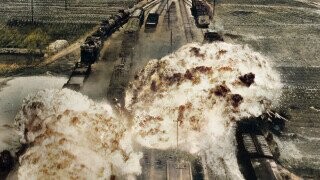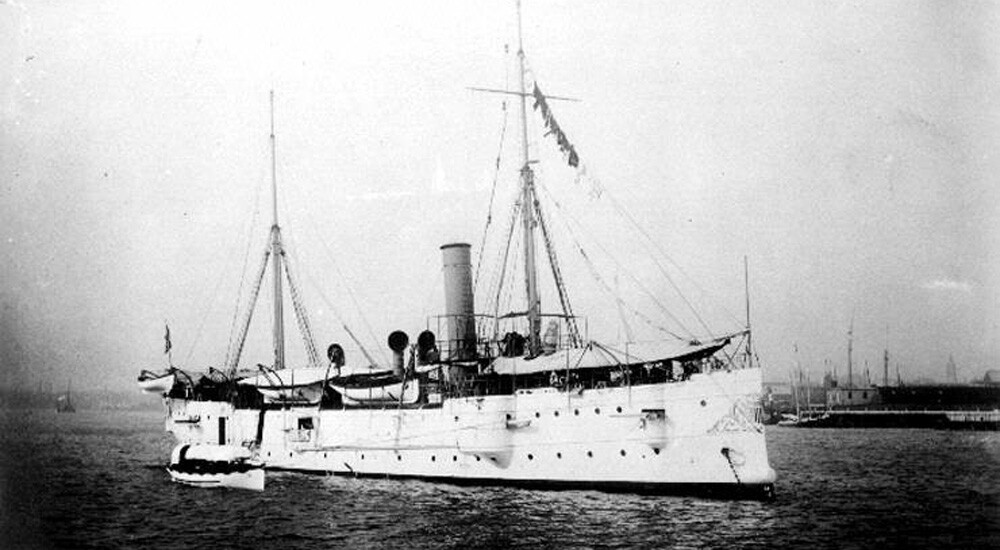5 Screwed-Up Operations America Pulled Overseas

America boasts about having the greatest military in the world, so let's relive some of the country's biggest hits. And when we say "hits," we mean like "hitting" a sleeping homeless woman with a baseball bat, because the US has done some pretty awful stuff.
The United States Firebombed North Korea So Hard
So, you know the US fought against North Korea in the Korean War—we're not looking to surprise anyone with that. But if you've never heard too many details about just exactly how the US fought North Korea, well, maybe there's a reason for that.

CBS
Quick recap first: The war started on June 25, 1950, when North Korea invaded South Korea. For the next three years, the countries waged ceaseless warfare, with North Korea being helped by the USSR and China, and South Korea receiving help from the UN. At the beginning, North Korea was pretty much kicking a lot of ass and taking names. Then the US Air Force took out North Korean transport and industrial areas. Fair enough.
Then the US military decided to do the strategic maneuver of bombing the absolute shit out of civilian populations in North Korea, razing many North Korean cities, resulting in mass casualties and enough property damage to make Godzilla go “oh, wow.” Let's put it this way: You know how the US dropped a lot of bombs during World War II? How one raid on Tokyo killed more people than even the nuke dropped on Nagasaki? Well, the US dropped more bombs on North Korea than they did in the entire Eastern Theater of World War II combined.
They destroyed 85% of buildings in the entire country and killed some 20% of the population. Asked about firebombing one collection of towns (rather than striking specific military targets), General Douglas MacArthur said in a cartoonishly evil fashion, "Burn it if you so desire. Not only that, Strat, but burn and destroy as a lesson to any other of those towns that you consider of military value to the enemy."
Now, no one's saying North Korea were the good guys in this war, but targeting civilians like that ... well, that's generally what's known as a "war crime." Still, at least the US didn't give in to all MacArthur's suggestions. Including his one to drop 34 nukes and create "a belt of radioactive cobalt across the neck of Manchuria so that there could be no land invasion of Korea from the north for at least 60 years."
The US Backed A Guatemalan Coup Just To Profit Off Corruption
Americans take a lot of things for granted. Take, for example, the fruit you get at the supermarket, particularly bananas. They’re always stocked in great abundance for a low price, and you don’t really have to think about it. And yet bananas are a blood fruit with a pretty oppressive history involving totalitarian corruption, war, and thousands of dead Guatemalans.
In the middle of the 20th century, a charming little American corporation basically held Guatemala in an iron vice grip. Today, they go by another name, Chiquita Brands International, but back then, they were ruthlessly tyrannical and were known as the United Fruit Company. United Fruit owned a whopping 42% of all of Guatemalan land, more than half of the country's exports, and all communication lines. This went on for decades unopposed, as America had intense interest in keeping United Fruit in charge.

You might be asking how a simple fruit company could have possibly controlled an entire country more than its own government. Well, that’s simple. Guatemala's largest export was bananas, giving it the nickname "banana republic," which is basically any poor country that depends on a single product, like bananas. This meant that United Fruits had enormous financial control over a large chunk of Guatemala’s economy.
When this grip was threatened, the US backed a coup in 1954, which threw out then president Jacobo Arbenz, installing Carlos Castillo Armas, and allowing United Fruit to continue exploiting the country. Talk about a crazy bananas dick move.
Supporting State Terrorism In Operation Condor
Starting in 1975, the United States backed a series of far right dictatorships in various South American countries, like Argentina, Chile, and Paraguay. This campaign, called Operation Condor, was so extensive that, honestly, we can't really do it justice in a single section of an article. But to sum it up just enough to push you to read more about it, let's tell you this: The operation killed tens of thousands, and imprisoned hundreds of thousands.

Who was he? Oh, just the president of Peru.
For example, the US backed Alfredo Stroessner, an anti-communist dictator, in Paraguay to disrupt left-wing groups and democracies, leading to a reign of terror. In Brazil, the campaign may have involved assassinating multiple ex-presidents.
This would continue on for years. The US connection was kept totally secret till 1999, and even since then, we've had to rely on a slow trickle of declassification to let us know all the ways the CIA enthusiastically helped.
Invading The Dominican Republic As Part Of Anti-Communist Efforts
Before the Dominican Civil War of 1965, the country was deep in its own political troubles, starting with a dictator named Rafael Trujillo. Like most brutal despots, Trujillo was not quite loved universally. Most votes for him were fabricated or forced, considering he made himself the only possible person who could ever run for president for each election. And, as history tells us, what happens to brutal tyrants after years of tyranny is they often get assassinated, which is exactly what happened to Trujillo in 1961.
This eventually led to the 1962 election of liberal president Juan Bosch, whose idea of a healthy nation did not involve rigging elections or leading his people with an iron fist. This did not sit so well with the Dominican military at the time, which led to his overthrow in 1963, creating a power vacuum for multiple political groups to fight over, eventually culminating in the Dominican Civil War in 1965.

That’s where the United States came in. Fearing that the Dominican Republic would fall into the hands of communism during this unrest, Lyndon B. Johnson deployed 22,000 soldiers to the country to ‘talk’ things over. 3,000 Dominicans died in the Civil War, and while the American presence may have kept that number from going even higher, plenty of Dominicans remained bitter for decades about the occupation.
The US withdrew after the right-wing president backed by the US, Joaquin Balaguer, was put into power. Later, militaries officials admitted that it looked like there was never any danger of communists taking over the country, and so America never needed to intervene at all. Whoops!
America Straight-Up Looted The Haitian Treasury
It all started when Woodrow Wilson looked at Haiti and went, "Hm, I could make money off this."
See, Haiti had a bit of gold just lying around in their banks for the taking, and Haiti had been forced into debt by Germany and France since 1825, giving it a pretty unstable economy that wasn’t able to withstand a depression. That’s when on December 1914, the US decided to sneak into Haiti via warships and stole their gold reserves, leaving the country in economic shambles.

This opened the gate for the occupation of Haiti by the US in 1915. Wilson sent 330 Marines to take over Haiti’s government, controlling the entirety of its economy and political sphere. Scores of human rights abuses occurred under the occupation, with thousands of Haitians being killed, tortured, or sent to labor camps.
The legacy of this was devastating for many reasons, splintering the country in many pieces, both economically and culturally, leaving Haiti one of the poorest nations in the world. That’s just what happens when world cop USA decides to steal whatever they want from anyone with little pushback.
Top image: U.S. Army Military History Institute
